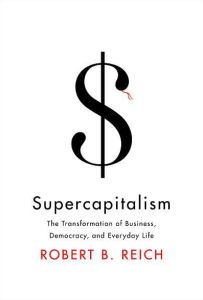Join getAbstract to access the summary!

Join getAbstract to access the summary!
Robert B. Reich
Supercapitalism
Knopf, 2007
What's inside?
Capitalism expanded the U.S. middle class and balanced citizens’ interests; “supercapitalism” threatens such benefits.
Recommendation
Robert Reich, President Bill Clinton’s secretary of labor and one of the most provocative public intellectuals in the U.S., unflinchingly explores the transformation of American democratic capitalism into a system of “supercapitalism,” in which corporations and the market exercise apparently unbridled power. Reich considers and then discards most, if not all, of the standard leftist explanations for this development. Instead, in a logically coherent analysis, he arrives at some startling but convincing conclusions. For example, arguing that the government should never treat corporations like people, Reich advocates eliminating the corporate income tax. getAbstract recommends this book to anyone who wants to understand today’s economics, politics or fiscal events. Although recent legislation attempts to address some of the issues Reich raises, such as the flow of corporate money into political campaigns, his analysis is still relevant.
Summary
About the Author
Robert B. Reich is professor of public policy at the University of California at Berkeley. He was secretary of labor under President Bill Clinton. In 2003, he received the Václav Havel Foundation Prize for pioneering work in economic and social thought.



















Comment on this summary